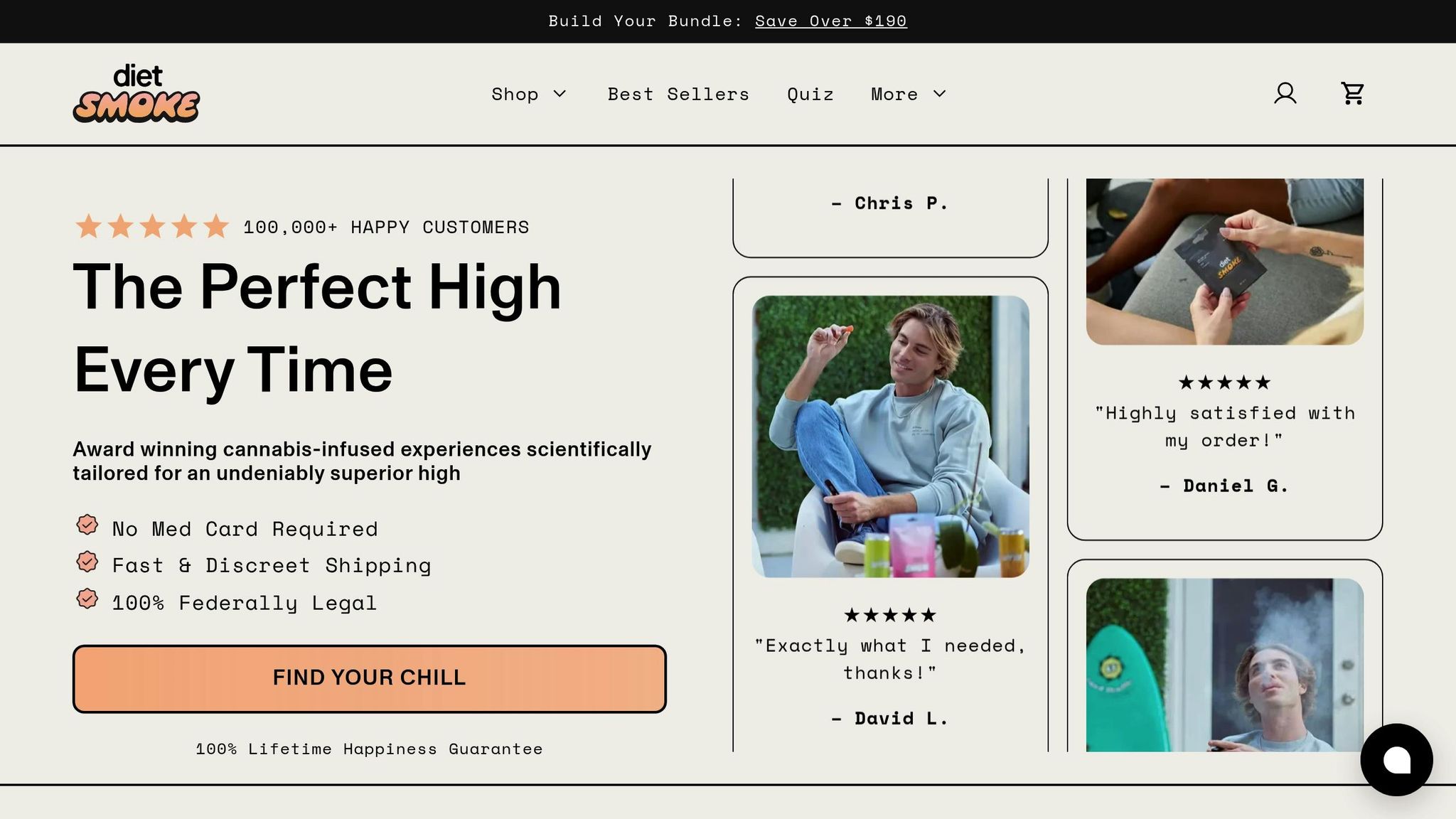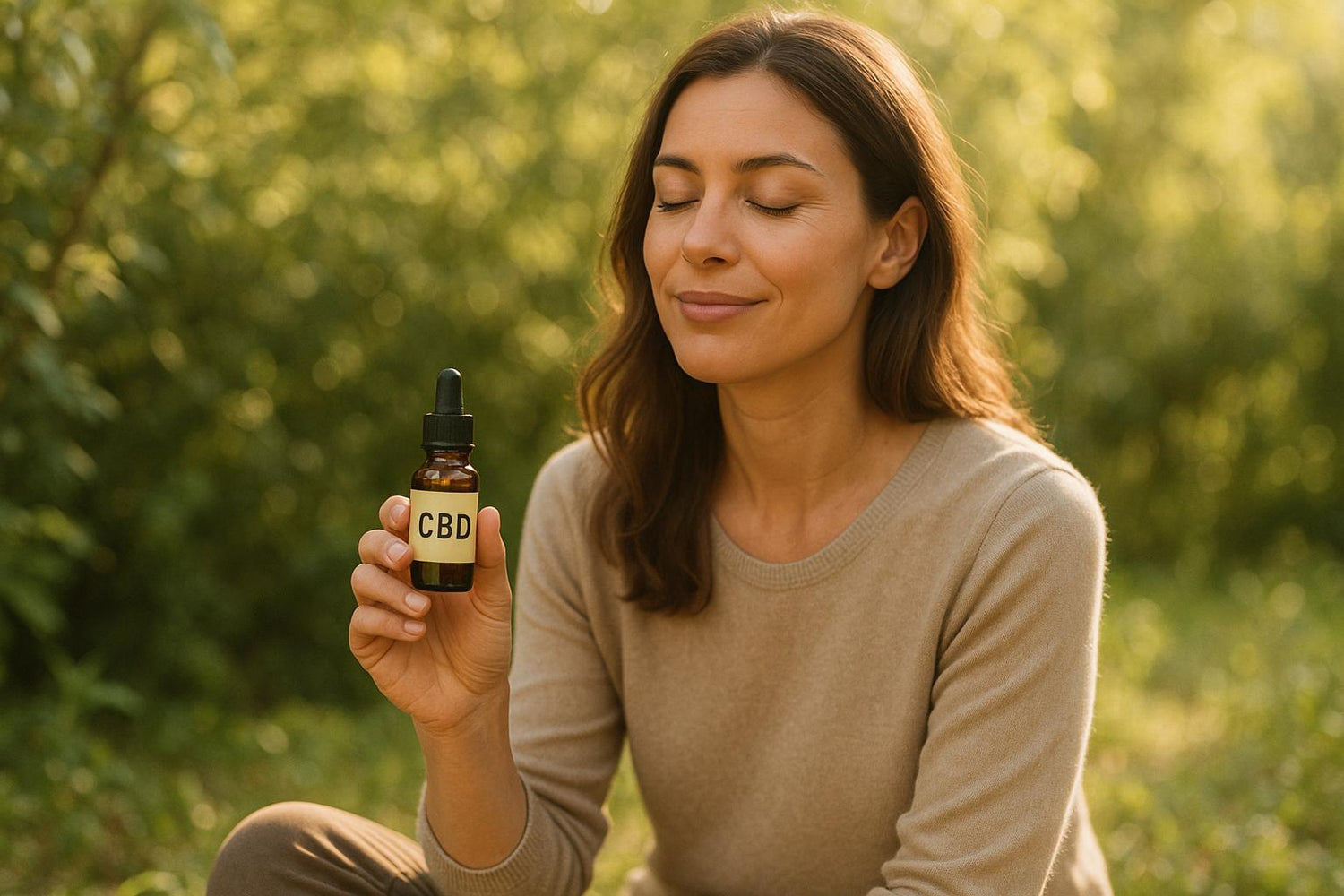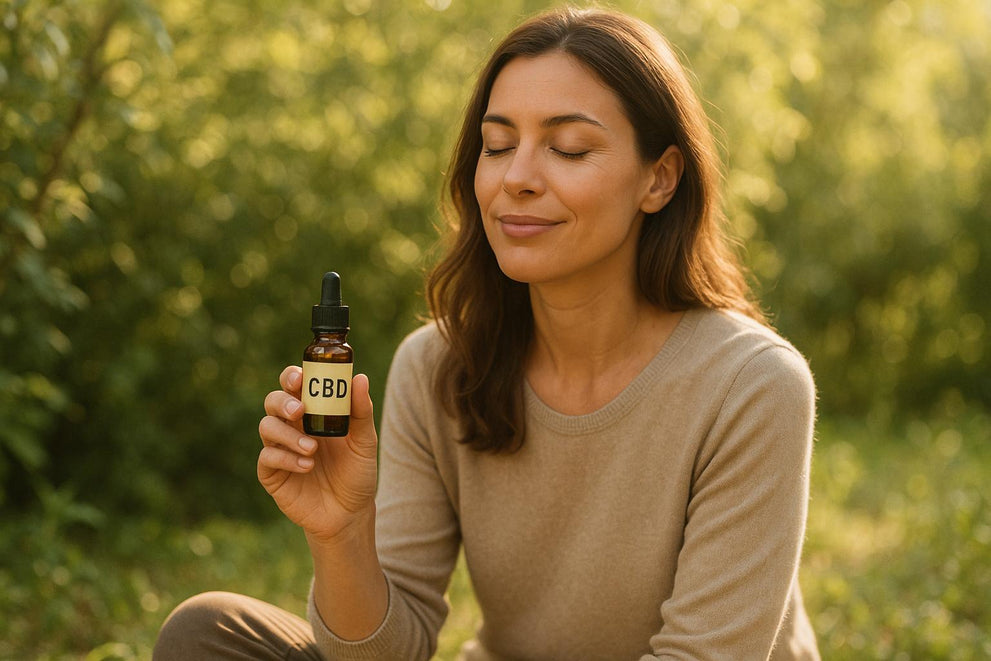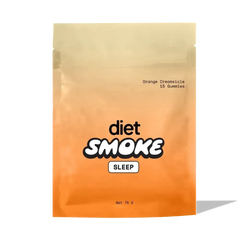CBD can help your body manage stress naturally by working with your endocannabinoid system (ECS). The ECS is a key system in your body that regulates stress, mood, and more. CBD interacts with this system to restore balance without producing a "high." Here's what you need to know:
- How CBD works: CBD boosts your ECS by increasing natural compounds like anandamide, which calm stress responses. It also interacts with serotonin receptors to improve mood.
- Stress relief research: Studies show CBD reduces anxiety by 18–78% during stressful events, and long-term use improves symptoms by up to 25%.
- Safe and effective: CBD is non-intoxicating, well-tolerated, and has no evidence of abuse potential according to the World Health Organization.
- Getting started: Begin with 10–20 mg of CBD daily, adjust gradually, and choose high-quality, lab-tested products for consistent results.
CBD offers a natural way to support your body's stress management system. Keep reading for science-backed insights and practical tips on using CBD effectively.
Endocannabinoid System | ECS Explained
How the Endocannabinoid System Controls Stress
The endocannabinoid system (ECS) serves as the body’s built-in stress management system, working closely with the hypothalamic-pituitary-adrenal (HPA) axis to coordinate responses to stress. Whether it’s a looming deadline, a tense conversation, or another daily challenge, the ECS steps in to regulate how your body reacts by engaging with the HPA axis.
"Endocannabinoid signaling is involved in both activating and terminating the hypothalamic-pituitary-adrenal axis response to both acute and repeated stress."
- Matthew N Hill, Laboratory of Neuroendocrinology, The Rockefeller University
This dual role - kicking off and later calming down the stress response - shows how vital the ECS is to mental well-being. When it’s functioning as it should, the ECS helps manage stress effectively. But when the system is out of sync, stress can linger or become chronic. To understand this better, let’s look at the role of specific cannabinoid receptors in managing stress.
Cannabinoid Receptors and Stress Response
The brain is home to millions of cannabinoid receptors, with CB1 receptors playing a major role in stress regulation. These receptors are located in key areas tied to emotions and stress, such as the hypothalamus, amygdala, hippocampus, and prefrontal cortex.
Under normal circumstances, anandamide (AEA) - a naturally occurring endocannabinoid - helps keep the amygdala calm by limiting glutamate signaling. When stress hits, however, FAAH (an enzyme) breaks down AEA, leading to increased glutamate release and triggering the stress response.
During stressful situations, the body also ramps up production of 2-arachidonoylglycerol (2-AG), another endocannabinoid. This increase in 2-AG helps the ECS prepare for future stressors. Typically, acute stress causes a sudden drop in anandamide levels, while 2-AG levels rise slightly later.
CB2 receptors, which are mostly found in immune cells, also contribute to stress management by reducing inflammation in the brain. Research further shows that when CB1 receptors are blocked or don’t function properly, HPA axis activity increases - both during normal conditions and in response to acute stress. This highlights how crucial CB1 receptors are in keeping stress responses balanced.
ECS and the HPA Axis Connection
The relationship between the ECS and the HPA axis is central to how the body handles stress. The HPA axis - made up of the hypothalamus, pituitary gland, and adrenal glands - is the main system that responds to stress, releasing hormones like cortisol when a threat is detected.
"The hypothalamic-pituitary-adrenal (HPA) axis represents the major hormone system responsible for maintainance of the homeostatic balance in response to stressful stimuli."
- Daniela Cota, Department of Psychiatry, Obesity Research Center, Genome Research Institute, University of Cincinnati
The ECS can either dampen or amplify HPA axis activity, giving the body the flexibility to respond appropriately to different stress levels. CB1 receptors, which are found throughout the HPA axis - in the hypothalamus, limbic system, pituitary gland, and adrenal glands - allow the ECS to influence stress responses at multiple points.
The HPA axis releases glucocorticoids, such as cortisol, which in turn affect ECS signaling. This creates a feedback loop that helps the body dial down its stress response once the immediate threat is over. This feedback mechanism is essential for preventing prolonged stress and maintaining balance.
When the interaction between the ECS and the HPA axis becomes dysregulated, it can lead to mental health challenges, such as anxiety or depression. This underscores how vital a well-functioning ECS is for maintaining emotional resilience and overall mental health.
How CBD Affects the Endocannabinoid System
CBD interacts with the endocannabinoid system (ECS) by boosting the activity of natural endocannabinoids. Unlike THC, which directly binds to ECS receptors, CBD works indirectly. It influences how receptors function and increases the availability of the body's own endocannabinoids, helping the ECS perform more efficiently.
One way CBD achieves this is by inhibiting enzymes like FAAH and modulating MAGL. These enzymes typically break down endocannabinoids like anandamide and 2-AG. By slowing this breakdown, CBD extends the effects of these compounds, allowing for more sustained receptor activity. This enzymatic influence is key to CBD’s ability to fine-tune how the ECS responds.
CBD also acts as an allosteric modulator at CB1 receptors and enhances CB2 signaling. This dual action helps regulate inflammation and provides more precise receptor responses.
CBD's Effects on Brain Chemicals
CBD doesn’t just stop at the ECS - it also impacts brain chemicals that are essential for managing mood and stress. For instance, it acts as an agonist at serotonin 5-HT1A receptors, which are known to play a major role in reducing anxiety. Since serotonin is closely tied to feelings of happiness and calm, this interaction can promote a more relaxed state.
Additionally, CBD interacts with TRPV1 receptors. These receptors influence pain perception, temperature regulation, and how the body processes stress signals. Research has also found that CBD can elevate anandamide levels in the bloodstream, further highlighting its role in balancing endocannabinoid levels.
sbb-itb-0d19bd1
Using CBD for Stress Relief: Research and Tips
Research on CBD for Stress
CBD's ability to support the endocannabinoid system (ECS) has drawn significant attention for its potential to ease stress. Research highlights its promising role in reducing anxiety and related conditions.
Preclinical studies suggest CBD can help with anxiety disorders, including panic attacks, social anxiety, OCD, and PTSD, even with a single dose. While human studies are still catching up, they consistently show that CBD reduces anxiety symptoms.
One meta-analysis revealed that CBD significantly lowers anxiety, with acute doses reducing stress scores by 18–45% before, 18–44% during, and 27–78% after stressful events. Long-term studies add to this, showing a 25%–16% reduction in symptoms after one month of CBD use, compared to minimal improvements in placebo groups (0% and 4%).
Specific conditions benefit from targeted CBD use. For example, individuals with social anxiety disorder respond well to doses of 300–400 mg, experiencing notable reductions in anxiety in both short- and long-term studies. Similarly, a single 300 mg dose has been shown to help PTSD patients by easing anxiety and cognitive impairments triggered by trauma recall.
Real-world data backs these findings. In a study led by Crippa and colleagues, healthcare workers experiencing burnout saw significant reductions in anxiety and emotional exhaustion after taking 150 mg of CBD twice daily for 14 days.
Safety is another strong point. The World Health Organization notes:
"In humans, CBD exhibits no effects indicative of any abuse or dependence potential…. To date, there is no evidence of public health related problems associated with the use of pure CBD."
CBD is generally well-tolerated, even at doses as high as 1,500 mg per day, with no reports of slowed motor skills, mood issues, or abnormal vital signs. These findings emphasize the importance of proper dosing and consistent use, which we’ll explore next.
How to Use CBD for Stress Management
If you’re considering CBD for stress relief, research-based dosing strategies can help you get started. A good starting point is 10–20 mg daily, with adjustments based on your weight (1–6 mg per 10 pounds). Most people begin with 25 mg, observing their body’s response before making changes. If you don’t notice the desired effects after 3–5 days, increase your dose by 5–10 mg.
For consistent relief, split your daily dose into two parts - this ensures more even effects throughout the day. Regular use is key; take CBD daily for 1–2 weeks while keeping a log of your dose, timing, and results. This helps you fine-tune your routine.
Timing matters too. For general stress relief, split your dose between morning and evening. If sleep is your main concern, take a larger dose 30–60 minutes before bedtime. For specific stressors, like a big presentation, take CBD ahead of time to help manage anxiety.
The type of CBD you choose also affects how it works. CBD oil absorbs quickly when placed under the tongue, while gummies take longer to kick in but last longer. Full-spectrum CBD includes all hemp compounds, including trace amounts of THC; broad-spectrum contains multiple cannabinoids without THC; and CBD isolate is pure CBD. Choosing the right product - whether oil, gummies, or another form - can help you get the most out of your CBD routine.
Keep in mind that individual factors like body weight, genetics, health, and tolerance can influence how CBD affects you. What works for someone else might not work the same way for you, so patience and self-observation are important.
If you’re on other medications or managing serious health concerns, consult a doctor familiar with CBD. Honest communication with your healthcare provider ensures safe and coordinated care.
Ultimately, finding the right approach involves some trial and error. Consistency, careful observation, and working with your body’s natural systems can help you tap into CBD’s stress-relieving potential.
High-Quality CBD Products for Stress Relief
Why Choose High-Quality CBD Products?
When it comes to using CBD for stress relief, the quality of the product you choose makes all the difference. With an estimated 13–26% of people using CBD products each month, selecting reliable options is crucial - especially since the FDA doesn’t regulate CBD products like dietary supplements.
High-quality CBD products are typically lab-tested, ensuring they deliver the potency they promise, are free from harmful contaminants, and comply with federal regulations, including containing less than 0.3% THC. Research suggests that broad-spectrum CBD may work better for stress relief compared to CBD isolate. For instance, a 2023 study showed that participants experienced greater stress reduction with broad-spectrum CBD, although some preferred the taste of isolate-based products. Products that clearly list their ingredients and include additional stress-relieving compounds - like adaptogens (e.g., ashwagandha) or calming botanicals like lavender - can provide even more comprehensive benefits.
Diet Smoke’s CBD Products for Stress Relief

Diet Smoke, a Fort Lauderdale-based company, offers a range of CBD products tailored for stress management. With over 100,000 happy customers, they’ve built a reputation for delivering high-quality gummies, vapes, and pre-rolls designed to promote relaxation and calmness. Every product undergoes lab testing to ensure potency, purity, and compliance with federal standards. Plus, their 100% Lifetime Happiness Guarantee gives customers added peace of mind.
Their gummies are ideal for long-lasting stress management throughout the day, while their vapes provide fast-acting relief for moments of acute stress. Customer reviews frequently praise the effectiveness of these products in improving relaxation, sleep quality, and managing daily stress. Many also appreciate the fast and discreet shipping.
"High quality, worth every penny!" - Chris P.
Diet Smoke leverages predictive analytics to personalize product recommendations, which has resulted in a 40.2% increase in cross-sells. Co-founder Zachary Wolfson explains:
"This provides a great customer experience, increased cross-sell rate, and average order value."
Comparing CBD Product Types for Stress Relief
Different types of CBD products cater to varying stress management needs. Here’s a quick comparison to help you decide which might work best for you:
| Product Type | Onset Time | Duration | Bioavailability | Best For |
|---|---|---|---|---|
| Gummies | 30–120 mins | 6–8 hours | 13–20% | Daily stress management, consistent dosing |
| Vapes | 1–5 mins | 1–2 hours | Up to 45% | Acute stress, immediate relief |
| Oils/Tinctures | 15–45 mins | 4–6 hours | 20–30% | Flexible dosing, balanced effects |
Many users find that combining different product types offers a more well-rounded approach to stress management. For example, gummies can provide steady, all-day support, while a vape can be a go-to option for sudden, stressful moments. With the variety of options available, it’s easy to customize a CBD routine that fits your lifestyle and needs.
Conclusion: CBD and the Endocannabinoid System for Stress Relief
The connection between CBD and the endocannabinoid system presents a natural and research-backed way to manage stress. As we've discussed, CBD doesn't impose artificial changes on your body; instead, it supports and enhances your body's natural ability to regulate stress.
In fact, seven double-blind, placebo-controlled trials involving 232 participants showed that CBD significantly lowers stress responses, with over 90% of users reporting reduced stress levels.
CBD's effectiveness stems from its multi-layered approach. By boosting CB1 and CB2 receptor activity through increased anandamide (AEA) levels, it strengthens the endocannabinoid system's stress-buffering abilities. Additionally, CBD interacts with 5-HT1A receptors and activates PPARγ pathways, addressing both the psychological and inflammatory aspects of stress.
Experts recognize the potential of this compound:
"CBD is a non-toxic, non-psychotropic, powerful dietary supplement that can help maintain ECS and HPA axis homeostasis." - Clifford Morris, Ph.D. Cand., Chief Chemist and Research Scientist
To maximize these benefits, it's essential to choose high-quality CBD products. Look for third-party lab testing, clear ingredient labels, and guarantees like a 100% Lifetime Happiness Guarantee to ensure you're using products that deliver consistent results. This aligns with the importance of transparency and trust in manufacturing.
When starting, begin with small doses (under 150 mg/day) and adjust gradually to find what works best for you. Whether you prefer gummies for steady support or vapes for quick relief, CBD offers a sustainable way to manage stress and improve overall well-being. Exploring options like a premium cart weed can also provide a convenient and discreet way to complement stress management routines.
This natural approach holds significant therapeutic potential:
"Modulating endocannabinoid system activity may have therapeutic potential in almost all diseases affecting humans." - Pal Pacher and George Kunos, U.S. National Institutes of Health (NIH) scientists
FAQs
How does CBD work with the endocannabinoid system to help reduce stress without making you feel high?
CBD works with your body's endocannabinoid system (ECS) to support its natural ability to maintain balance, especially during times of stress. Unlike THC, which binds directly to CB1 receptors and causes psychoactive effects, CBD takes a different approach. It subtly adjusts how these receptors function, helping to regulate stress hormones like cortisol and encouraging a sense of calm.
On top of that, CBD interacts with 5-HT1A serotonin receptors, which play a key role in mood regulation. This combination of actions helps ease stress and anxiety without any intoxicating side effects. It's no wonder CBD has become a go-to option for those looking for natural stress relief without the “high.”
What is the best way to start using CBD for stress relief, and how can you adjust your dosage over time?
When beginning to use CBD for stress relief, it’s smart to start with a low dose, typically around 10-25 mg per day. If you’re new to CBD, even starting with 5-10 mg can be a good way to see how your body reacts. From there, you can gradually increase the dose by 5 mg at a time every few days or so until you discover what works best for you.
Since everyone’s body responds differently, it’s essential to pay attention to how you feel and adjust your dosage as needed. If you decide to increase your intake, do so gradually and keep an eye out for any side effects. The key is to start small, take it slow, and let your body guide you toward the dose that helps you manage stress effectively.
Why should you choose high-quality, lab-tested CBD products for managing stress?
Choosing top-tier, lab-tested CBD products is crucial for ensuring both safety and effectiveness when it comes to managing stress. Lab tests confirm that the product is free from harmful substances and that the cannabinoid levels are accurate, so you know exactly what you're putting into your body.
When CBD is of high quality, it’s more likely to interact effectively with your endocannabinoid system, the part of your body responsible for regulating stress and encouraging relaxation. Opting for reputable, lab-tested options can help you feel more confident in supporting your overall well-being and finding a reliable sense of calm.
Related posts
- CBD for Mood Swings: How It Works
- Endocannabinoid System Basics for Stress Relief
- THC vs. CBD: Effects on Brain Stress Pathways
- Endocannabinoid System and Stress Resilience





